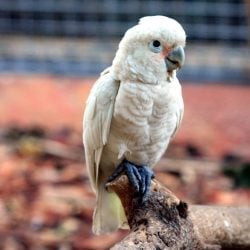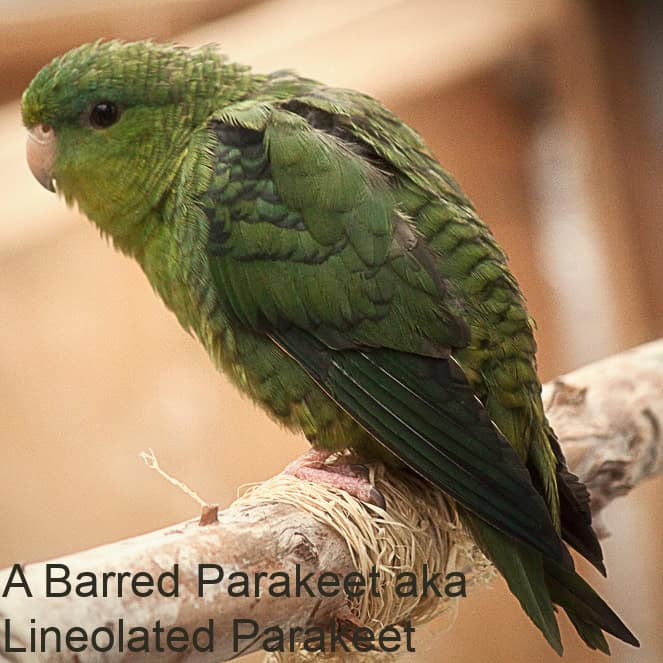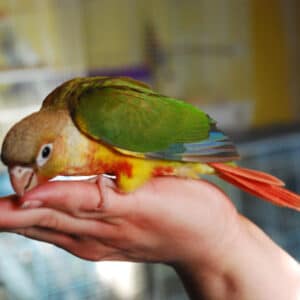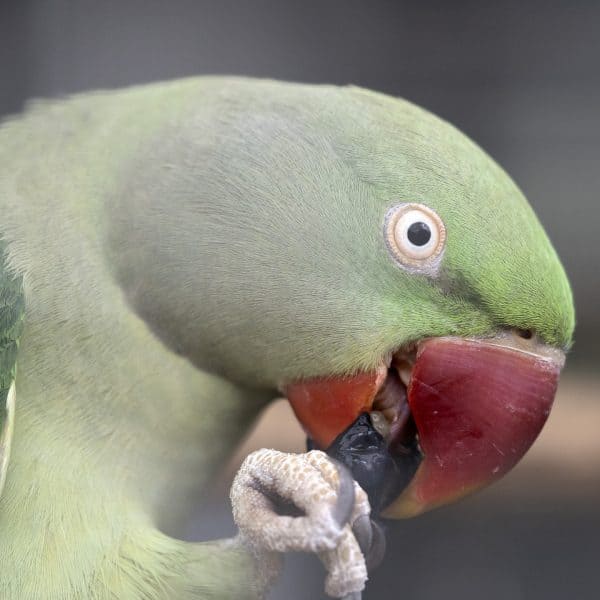Thomas F. is concerned with breeding his birds.
I have been breeding budgies, linnies (lineolated parakeets), and scarlet-chested parakeets for many years. They have a very good diet and can go outside in the summer.
For the last two years, the fertility has been very poor. What is the solution?
Dear Thomas
Poor fertility in your birds could be due to several factors. Here are some potential causes and solutions:
If nothing has changed in your breeding behavior, meaning diet, lighting and housing, then perhaps your birds are aging and thus are less productive.
Males can mate until they are quite a bit older, but females may slow down laying.
Are you sure nothing else has changed?
Outside of your aviary, could there be more activity than prior?
- More noise?
- Other animals or birds that might affect your flock?
- If you have windows in your aviary facing out, could you have predatory birds or animals in view that may upset your birds?
- How is your lighting?
- Have you added or removed anything in the room?
- If you depend on outside light, has the area around your windows become overgrown? Or did you recently prune everything back?
There is a supplement that might help.
While I await your answers here are some additional conditions to look for and breeding solutions.
Potential Causes
- **Age of Breeding Pairs**: As birds age, their fertility can decline. Ensure your breeding pairs are not too old.
- **Nutrition**: While you mentioned they have a good diet, ensure it meets all their specific breeding needs, including adequate calcium, vitamin D, and protein levels.
- **Health Issues**: Illness or subclinical infections can affect fertility. Regular health checks and screenings for diseases are important.
- **Environment**: Even though they go outside in the summer, factors like temperature fluctuations, inadequate lighting, and stress can impact fertility.
- **Genetics**: Poor genetic diversity or inbreeding can result in reduced fertility.
- **Breeding Cycle**: Birds need the right conditions to stimulate breeding, including the correct photoperiod (day length) and environmental cues.
Solutions
- **Evaluate Age and Pairing**: Rotate out older birds and pair younger, healthy birds.
- **Enhanced Diet**: Consult with an avian nutritionist to ensure the diet is optimized for breeding. Consider adding supplements specifically designed for breeding birds.
- **Health Checks**: Have a veterinarian perform regular health checks and screenings for common avian diseases. Treat any infections or health issues promptly.
- **Improve Environment**: Ensure stable temperatures, proper humidity, and adequate lighting that mimics natural day-night cycles. Reduce stress by minimizing disturbances and providing a safe, quiet breeding area.
- **Genetic Diversity**: Introduce new birds from different genetic lines to avoid inbreeding and enhance genetic diversity.
- **Monitor Breeding Conditions**: Ensure that the birds have appropriate nesting sites, privacy, and all conditions conducive to breeding.
Specific Recommendations
- **Supplementary Lighting**: Use full-spectrum lighting to simulate natural sunlight, especially if indoor conditions are not ideal.
- **Nesting Materials**: Provide high-quality nesting materials and check that nesting boxes are clean, secure, and in optimal condition.
- **Professional Consultation**: Seek advice from a specialist in avian breeding to assess your specific setup and recommend tailored solutions.
If the problem persists despite these adjustments, consulting an avian veterinarian or a professional breeder for an in-depth evaluation may be beneficial.
Please let us know if you find anything that may be of concern or if you resolve the issue. We would like to hear back from you.
Catherine
Author Profile

Latest entries
 Bird & Parrot CareJune 20, 2025Understanding the Best Way to Use Prevue Pets Mimic Me Voice Trainer
Bird & Parrot CareJune 20, 2025Understanding the Best Way to Use Prevue Pets Mimic Me Voice Trainer Bird BehaviorJune 6, 2025How Do I Keep My Parrot From Dumping His Food Every Day?
Bird BehaviorJune 6, 2025How Do I Keep My Parrot From Dumping His Food Every Day? Birds & LightingMay 16, 2025I Am Seeking Clarity About Lighting for My Birds Cage
Birds & LightingMay 16, 2025I Am Seeking Clarity About Lighting for My Birds Cage Bird RescueApril 29, 2025How Do We Re-Home a 17 yr Goffin Cockatoo?
Bird RescueApril 29, 2025How Do We Re-Home a 17 yr Goffin Cockatoo?



